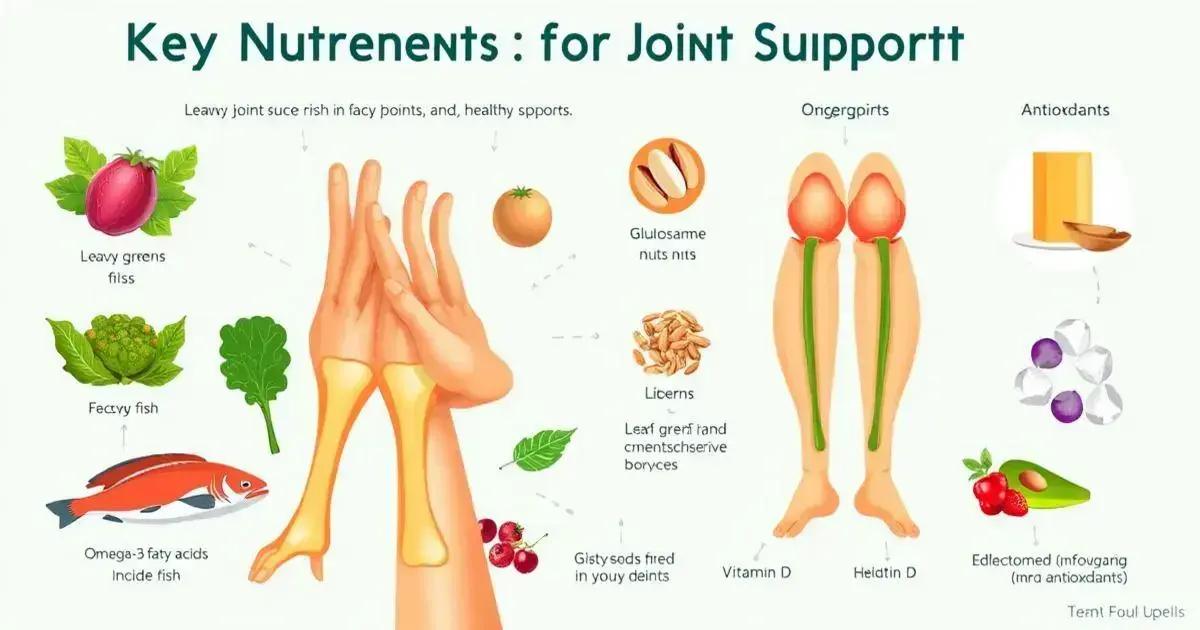Joint health supplements are designed to support joint function and alleviate discomfort, particularly for those with conditions like arthritis. Common ingredients include glucosamine, chondroitin, MSM, turmeric, collagen, omega-3 fatty acids, and hyaluronic acid, which may help reduce pain and enhance mobility. While generally safe, it’s important to consult a healthcare professional before starting any new supplement, especially if you’re on other medications. Many users report improvements within weeks to months, making these supplements a beneficial option for maintaining an active lifestyle.
Nutrients for joint health play a vital role in maintaining the integrity and function of joints, particularly as we age or engage in physical activities. Proper nutrition can help reduce inflammation, support cartilage repair, and promote overall joint function. Understanding which nutrients are essential for joint health can empower individuals to make informed dietary choices.
This article will delve into the key nutrients that contribute to joint health, their benefits, and how to incorporate them into your diet.
Understanding Joint Health
Understanding joint health is crucial for maintaining mobility and overall well-being. Joints are the areas where two or more bones meet, allowing for movement and flexibility in the body. Healthy joints enable us to perform daily activities, engage in physical exercise, and enjoy an active lifestyle.
Several key factors contribute to joint health:
- Cartilage: This smooth, flexible tissue covers the ends of bones at the joint, allowing for smooth movement and acting as a cushion to absorb shock during activities. Maintaining cartilage integrity is crucial for preventing joint pain and stiffness.
- Synovial Fluid: This lubricating fluid is found within the joint capsule and helps reduce friction between the cartilage surfaces during movement. Proper hydration and nutrition can support the production of synovial fluid.
- Ligaments: These tough, fibrous tissues connect bones to other bones and provide stability to the joint. Healthy ligaments are essential for maintaining joint integrity and preventing injuries.
- Tendons: Tendons connect muscles to bones and play a crucial role in joint movement. Strong and flexible tendons contribute to overall joint function and stability.
- Muscle Strength: Strong muscles surrounding a joint provide support and stability, helping to absorb impact and reduce stress on the joint. Regular strength training can enhance muscle support for healthy joints.
Common factors that can negatively impact joint health include aging, injury, obesity, and certain medical conditions like arthritis. Understanding these aspects of joint health can empower individuals to take proactive steps toward maintaining healthy joints, such as engaging in regular exercise, following a balanced diet, and considering supplements that support joint function.

Key Nutrients for Joint Support
To effectively support joint health, it’s essential to consume certain key nutrients that play a vital role in maintaining cartilage integrity and reducing inflammation. Here are some of the most important nutrients for joint support:
- Omega-3 Fatty Acids: Found in fatty fish (like salmon and mackerel), flaxseeds, and walnuts, omega-3s are known for their anti-inflammatory properties and can help reduce joint pain and stiffness.
- Glucosamine: This natural compound is often used in joint health supplements to support cartilage health and alleviate symptoms of osteoarthritis. It helps maintain the structure and function of joints.
- Chondroitin: Frequently paired with glucosamine, chondroitin is a component of cartilage that helps retain moisture and support joint function. It may also help reduce pain and improve mobility.
- Vitamin C: Essential for collagen synthesis, vitamin C helps stabilize the collagen molecule and is crucial for maintaining healthy cartilage. Foods rich in vitamin C include citrus fruits, strawberries, and bell peppers.
- Vitamin D: Important for calcium absorption and bone health, vitamin D supports strong bones that protect joints. It can be obtained from sunlight exposure, fortified foods, and fatty fish.
- Calcium: This mineral is vital for maintaining bone strength. A diet rich in calcium from dairy products, leafy greens, and fortified foods helps ensure healthy bones that support joints.
- Turmeric: Known for its anti-inflammatory effects, turmeric contains curcumin, which can help alleviate joint pain and improve mobility.
- Collagen: Collagen supplements or collagen-rich foods (like bone broth) can provide the necessary support for maintaining the structure of cartilage and joints.
By incorporating these key nutrients into your diet, you can effectively support your body’s joint health and function. A balanced diet rich in whole foods is essential for optimal joint support. Always consult with a healthcare professional or a registered dietitian for personalized nutrition advice tailored to your specific health needs.
Benefits of Nutrients for Joint Health
The benefits of nutrients for joint health are significant and can play a crucial role in maintaining joint integrity, reducing inflammation, and enhancing overall mobility. Here are some key advantages associated with specific nutrients:
- Omega-3 Fatty Acids: Known for their anti-inflammatory properties, omega-3s help reduce joint pain and stiffness, particularly in conditions like rheumatoid arthritis.
- Glucosamine: This nutrient supports cartilage health and may help alleviate symptoms of osteoarthritis, improving joint function and reducing pain.
- Chondroitin: Often used alongside glucosamine, chondroitin helps maintain cartilage structure and hydration, potentially reducing pain and improving mobility.
- Vitamin C: Essential for collagen synthesis, vitamin C helps stabilize and support the structure of cartilage, playing a vital role in maintaining joint health.
- Vitamin D: Important for calcium absorption and bone health, vitamin D helps maintain strong bones that support joints, reducing the risk of injuries and joint-related diseases.
- Calcium: Vital for bone strength, adequate calcium intake helps prevent conditions like osteoporosis, which can negatively impact joint health.
- Turmeric (Curcumin): Known for its potent anti-inflammatory effects, turmeric can help alleviate joint pain and improve overall joint function.
- Collagen: Collagen is essential for maintaining the structure of cartilage and joints. Supplementing with collagen can support joint health and reduce discomfort.
Incorporating these nutrients into your diet through whole foods or supplements can provide substantial benefits for joint health. A balanced diet combined with regular physical activity is key to maintaining optimal joint function and reducing the risk of joint-related issues.

Foods Rich in Joint Health Nutrients
Incorporating foods rich in joint health nutrients into your diet is an effective way to support your joints and maintain overall health. Here are some key foods that can help boost your intake of essential nutrients for joint health:
- Fatty Fish: Fish such as salmon, mackerel, and sardines are rich in omega-3 fatty acids, which have anti-inflammatory properties that can help reduce joint pain and stiffness.
- Bone Broth: Made by simmering animal bones and connective tissues, bone broth is an excellent source of collagen, glucosamine, and other nutrients that support joint health.
- Leafy Greens: Vegetables like spinach, kale, and Swiss chard are high in antioxidants and vitamins, particularly vitamin K, which is important for bone health and joint function.
- Nuts and Seeds: Almonds, walnuts, and chia seeds provide healthy fats, vitamin E, and omega-3 fatty acids, all of which support joint health and reduce inflammation.
- Fruits: Berries (such as strawberries and blueberries) are rich in antioxidants and vitamin C, which can help protect joints from oxidative stress and promote collagen synthesis.
- Legumes: Beans and lentils are good sources of protein and contain essential amino acids that support collagen production and overall joint health.
- Eggs: Eggs are a great source of protein and contain proline, an amino acid that plays a crucial role in collagen synthesis.
- Turmeric: This spice contains curcumin, known for its powerful anti-inflammatory effects, making it beneficial for reducing joint pain.
- Garlic: Garlic has anti-inflammatory properties and can help reduce joint inflammation, making it a great addition to meals.
By including these nutrient-rich foods in your diet, you can effectively support your joint health and reduce the risk of joint-related issues. A balanced diet, combined with regular physical activity, is key to maintaining optimal joint function and overall wellness.
Supplements for Joint Health
Supplements for joint health are dietary products designed to support the integrity and function of joints, particularly for individuals experiencing discomfort or conditions such as arthritis. These supplements often contain a combination of vitamins, minerals, and natural extracts known for their beneficial effects on joint health. Here are some common types of supplements used to promote joint health:
- Glucosamine: A natural compound found in cartilage, glucosamine is often used to help relieve joint pain and improve joint function, particularly in osteoarthritis.
- Chondroitin: Frequently paired with glucosamine, chondroitin helps maintain cartilage structure and may reduce pain and improve mobility in individuals with joint issues.
- MSM (Methylsulfonylmethane): An organic sulfur compound, MSM is known for its anti-inflammatory properties and can help alleviate pain and improve joint function.
- Turmeric (Curcumin): Known for its potent anti-inflammatory effects, turmeric can help reduce joint pain and stiffness and is often included in joint health supplements.
- Collagen: Collagen supplements, particularly those containing Type II collagen, support cartilage health and help alleviate symptoms of joint degeneration.
- Omega-3 Fatty Acids: Found in fish oil, omega-3s have anti-inflammatory properties that can help reduce joint pain and support overall joint function.
- Hyaluronic Acid: This compound helps lubricate joints and may improve mobility by providing cushioning and reducing friction between joint surfaces.
When considering supplements for joint health, it’s important to choose high-quality products and consult with a healthcare professional to determine the right combination and dosage that aligns with your health needs. By integrating these supplements into your health regimen, you can promote better joint health and enhance your quality of life.
Conclusion
In conclusion, supplements for joint health can play a crucial role in maintaining and improving joint function, particularly for individuals experiencing discomfort or conditions like arthritis.
By incorporating well-researched ingredients such as glucosamine, chondroitin, MSM, turmeric, collagen, omega-3 fatty acids, and hyaluronic acid into your regimen, you can effectively support your joints and reduce pain.
However, it is essential to choose high-quality supplements and consult with a healthcare professional before starting any new regimen to ensure they align with your specific health needs and conditions.
By taking proactive steps toward joint health through appropriate supplementation, you can enhance your mobility and overall quality of life.
FAQ – Frequently Asked Questions about Joint Health Supplements
What are joint health supplements?
Joint health supplements are dietary products designed to support joint integrity and function, often containing vitamins, minerals, and natural extracts.
What are common ingredients in joint health supplements?
Common ingredients include glucosamine, chondroitin, MSM, turmeric, collagen, omega-3 fatty acids, and hyaluronic acid.
How do glucosamine and chondroitin work for joint health?
Glucosamine helps maintain cartilage health, while chondroitin supports cartilage structure and may reduce joint pain and improve mobility.
Are joint health supplements safe to use?
Most joint health supplements are considered safe when used as directed, but it’s advisable to consult with a healthcare professional before starting any new supplement.
How long does it take to see results from joint health supplements?
Results can vary, but many individuals report improvements in joint pain and mobility within a few weeks to several months of consistent use.
Can I take joint health supplements with my medications?
Yes, but it’s important to consult with a healthcare provider before combining joint supplements with prescription medications to avoid potential interactions.


